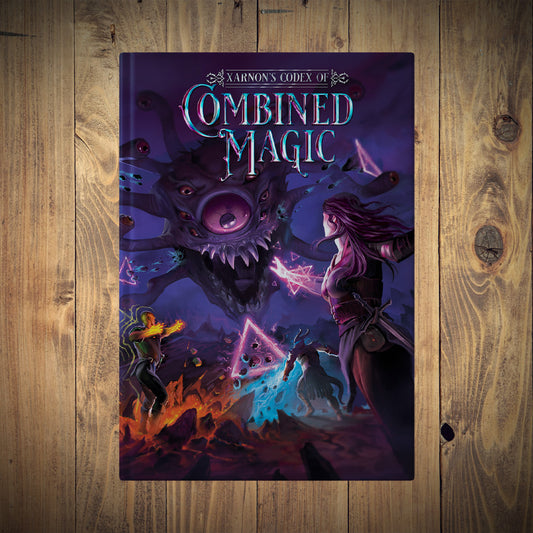
Arcane Magic Cults: Unique Ways to Bring Wizardry and Religion Together in Your D&D Campaign
Share
Arcane magic cults
In a previous blog post, I spoke about the nature of magic, and how thinking about and outlining just a few basic ideas of the meaning of magic in your world/setting can make the supernatural more interesting in your game. In that same blog post, I mentioned how arcane magic could spring from the gods and how wizard training centres, ie institutions of learning for arcane magic, could look like religious cults, rather than modern universities or boarding schools. In this post I’ll briefly describe three ideas for such cults.

Cult of Prometheus
This cult is based on Greek myth, although the cult itself is not. According to myth, Prometheus was one of the Titans, primordial beings who the Greek gods tamed and overthrew in their bid to bring order to the cosmos. Prometheus, for various reasons, took the secret of fire and gave it to moral humans. In punishment, Zeus, bound him to a mountain and instructed a bird to eat out his liver for the rest of time. In other words, Zeus did not want mortals to have this secret, and was pretty mad at Prometheus for giving us fire.
Many people interpret fire in this myth as a metaphor for science, or learning, or culture itself. However you want to think of it, we can interpret it as magic – Prometheus taught humans how to cast spells. This makes Prometheus the patron deity (even if he’s a Titan, not a god) of wizards, which immediately makes it pretty easy to see places of wizardly learning as Prometheus cults.
You can go many different directions from here. Let’s say Prometheus is still chained to a stone and getting his liver eaten. This also makes him a martyr who (intentionally or not) is suffering for a gift he gave humanity. More fodder for a religious cult – maybe even for non-magic-users. (Depending on how people like wizards, this might be a cult they like or fear). If he’s still chained to the mountain, he might be able to still send dreams or visions to his cult, dreams or visions that are a key part of learning how to cast spells. He may or may not grant spells to clerics – let’s say he does. This makes Prometheus cults a really interesting place, since they will include both clerics and wizards, who both see their way as the best way of honouring Prometheus. The ultimate goal of the cult may even be to free Prometheus from his chains (although that seems a little ambitious).
In any case, you can see that you don’t really need Zeus or the politics of Greek deities here – Prometheus is an archetype of the trickster god that steals a secret of the gods (magic) and gives it to mortals, and suffers for it – clearly a good source for a religious cult, with fun internal politics between clerics and wizards. Cults that might be hated by other religious cults, since this one is basically dedicated to (from the other gods’ point of view) a divine thief.

Cult of the scavenger scholar
Do you remember the opening scene of the 1982 Conan the Barbarian (if not, see it – it’s worth it). Conan’s father is describing the Riddle of Steel to Conan – how humans learned to forge steel. Long ago, the gods and giants got into a big war, and during all the fighting they left the secret of steel on the battlefield and forgot all about it. There it was found by men, presumably scavenging the devastation after they crawled out of the holes they had been hiding in while the gods and giants tore the world apart. Taking that secret, they forged steel and made their lives a lot easier (while also creating a lot of problems – steel weapons for example).
You can see the source of another cult – this one dedicated to a mythical founder who was not divine, but would probably be worshipped as a Hero. The ancient Greeks and many other civilizations didn’t just worship gods, they worshipped Heroes who did remarkable things.
In this instance instead of steel, the gods left the secret of magic on that battlefield. Maybe it was a spellbook, or a dream, or a revelatory flash. Whatever the exact source, the first person or people to get that secret would be pretty popular. Over time, they would become legendary, and now you get your cult. You could even have multiple cults, dedicated to the various people who discovered the secret out there on the battlefield. They may or may not get along. It could even explain the difference between druidic, arcane and monk-type magic – they each found different secrets on that battlefield. In his version of the origin of magic, there isn’t a strong source of tension between clerics and arcane (or other) magic-users – there was no theft. If anything, the clerics might think of arcane magic-users as the equivalent of dumpster-divers – grabbing the dirty left-overs forgotten by the gods.
Cults of becoming
A more straightforward approach is simply to say that certain gods taught humans to use magic because they wanted to. For some gods, it may have been an act of compassion, to help them out. Other gods may have done it on a bet – trying to prove to the other gods that humans are smart enough (or stupid enough) to mess with such power. Or maybe the gods were bored and just wanted to see what would happen. In any case, they taught a few mortals how to cast spells, and cults formed around that learning.
The fun part is this: when a god (or demon) teaches magic, that god’s perspective of the cosmos is a fundamental part of their being, and therefore a fundamental part of what they do – including teaching. Therefore the god is in the teaching in a mysterious way. In practice this means that anyone who learns magic from that god’s lineage of teaching is also taking in the god. So the more magic you learn, and more importantly, the more you use it, the more you become like that god – physically, mentally, spiritually. The more a magic-user gains in power, the more they lose themselves and become a mini-version of that god. Mortals who learned magic from a fae lord start transforming into elves; mortals who learned magic from a dragon god start transforming into dragons, etc. This adds a real edge to gaining power, and makes a pretty powerful link between a deity and learning magic. The cults who teach magic may know about this transformation and may keep it a secret, or make it an explicit goal.
These are just a few ideas to demonstrate how you can make arcane magic, and its learning institutions, more than just echoes of the secular universities we know today. Have fun.
Blaine




